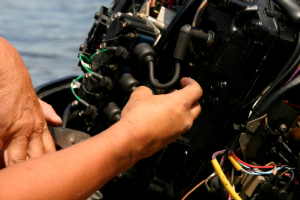 For many, boating activities are limited during the winter season. If your boat has been idle for the colder months, it is a good idea to check on some maintenance items to insure that your summer boating activities are relaxed and fun without the worry of mechanical issues.
For many, boating activities are limited during the winter season. If your boat has been idle for the colder months, it is a good idea to check on some maintenance items to insure that your summer boating activities are relaxed and fun without the worry of mechanical issues.
Make sure that your battery is put on a charger. A slow charge of an amp or two will take longer but it is better for your battery.
The head is always a priority when shutting down for winter weather. If you have a portable MSD, you will want to fill the water reservoir in the top section and add a dose of odor-killing chemicals to the bottom section. Secure it and strap it into place.
If you have a fixed head, you’ll have to drain the antifreeze from the lines. Opening the seacock will do the trick, but first remember to place a bucket under the through-hull; most antifreeze is toxic, and you should take it to an EPA-approved recycling center. Warning: You think this is overkill? Dogs in particular are attracted by the sweet smell and taste of antifreeze, and many die every year due to people’s carelessness — don’t let this stuff spill out and pool on the ground. Besides, disposal is a lot easier than you might think, because most local landfills and many auto repair centers will accept used antifreeze.
The same goes for the antifreeze you added to other plumbing, such as the freshwater system. In some cases, however, you may need to open one or more faucets or valves to allow the lines to vent properly. If you suspect antifreeze remains in any of these lines, force it out with a blast from an air compressor. Then fill all your tanks and allow water to run through the lines long enough to give the entire plumbing system a thorough rinse.
Another important item to check is your trailer. Chances are it did not get a lot of attention. Start by hitting the bearings with a fresh squirt of grease, check your tires for proper inflation and do a complete check of all the lights. If any don’t work, remember that the ground should always be your first suspect. Often, you can get an apparently dead light working again if you simply remove its mounting bolts and clean them, the metal they attach to and the ground connection. Then remount the light and connection.
Electronics hopefully fared well during the off-season, but before you launch you’ll need to do a complete check. With your GPS and fish finder, this is as simple as hitting the power button and making sure they fire up. When it comes to the VHF, however, you need to try a radio check. Luckily, there are now several services that make getting a radio check very easy.
Electrical items beyond your marine electronics require a thorough checkup, as well. Go through your boat from stem to stern, and test each and every light, switch, gauge and gizmo that requires juice. Electrical connections have a tendency to go bad during winter layup, and you don’t want any surprises when you launch the boat, so try them all out now. Once you’ve ensured that everything is working (or fixed what isn’t), take a moment to do some basic electrical maintenance: Visually inspect all connections, remove the fuse block’s cover and spray down the terminals with a corrosion inhibitor, and use a wire brush to scrub away any green crud on a terminal or wire.
Get visual with the rest of your boat. Make an inspection of your props to be sure there aren’t any dings that need fixing; check your fuel lines and connections for leaks by pumping the ball(s) until there’s plenty of pressure; and slap an eyeball on plastic parts that can deteriorate with time. If you spot any cracking or leaking, replace the offending item.
Now check the engine oil, stow that winter cover in the shed and reinstall your fully charged batteries. Get out and enjoy time with family and friends on your boat. Happy Boating!!!
“Boating World Magazine | The Leader in Recreational Trailerboating.” Boating World Magazine | The
Leader in RecreationalTrailerboating. N.p., n.d. Web. 20 June 2012.
